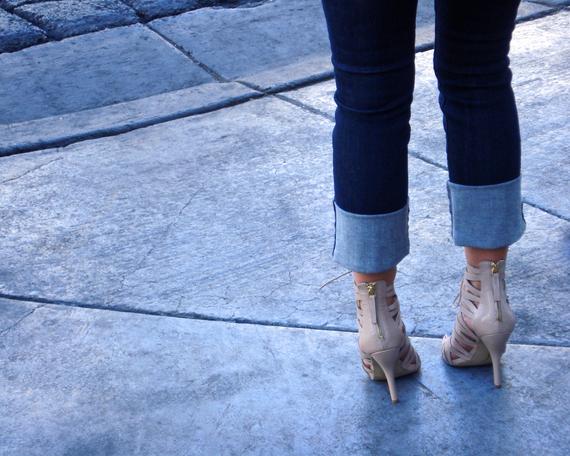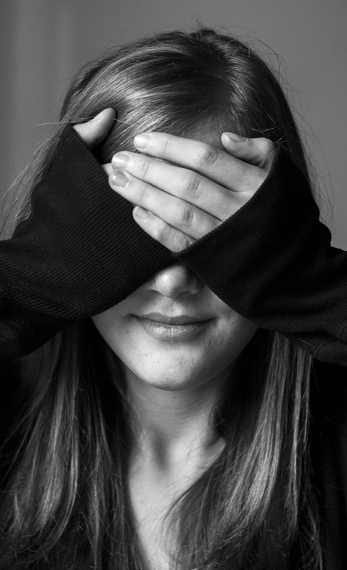If beauty's defining traits include thin legs, six-pack abs, a symmetrical face with deep set-eyes, perky breasts and frizz-free, shiny hair, a full 97 percent of American women are likely out of luck.
So, what do we do when most women are born with thighs that touch and hair that responds negatively to humidity?
Change the definition of beauty.
At its core, it seems innocent enough, even desirable. If the makers of Barbie, proficient Photo-shoppers and Hollywood-at-large insist that beauty looks only like Kim Kardashian, then our cellulite-speckled majority has no other choice than to revolt.
Make the language match our reality. Wear the bikini without the bikini body. Photograph your stretch marks. Change the standard.
Culturally, this is our pattern. When we find a word becomes to narrow to encompass us all, that same spirit of rebellion-for-a-noble-cause that filled the Boston Harbor with tea stirs us to crusade for change. Terms like "marriage" no longer fit the needs of those who desired arrangements outside of centuries of tradition, so we re-define them. Words like "friend" that formerly classified a meaningful relationship now characterize people we barely know.
That's what's next for beauty: a definition change.
Yet, do we really want everyone to be beautiful? Or, do we negate this term's value when we redefine it?
One scene in the Disney movie, The Incredibles, has stuck with me for a decade. Helen, the superhero-turned-mom character, tries to convince her son Dash that he's better off not using his super powers. In a vain attempt to keep a uniquely gifted little boy humble, she tells him, "Everyone's special."
To which Dash astutely replies, "Which is another way of saying no one is."
Sure. It's a nice sentiment. "Every woman is beautiful." Our motives may even be pure.
Pure but short-sighted.
Assuming a semantics change will impact the way women feel about their physical appearance strikes this woman, who has struggled with body image for decades, as a bit naive. I know firsthand that a social media newsfeed filled with comments chiming, "Beautiful!" holds little sway when I look in the mirror and cast judgment.
Proclaiming all women lovely isn't enough to stop eating disorders or end the spiral of depression associated with body shame. Deeply rooted internal problems aren't fixed with band aids.
Barbie's body can morph to look more like an Olympic gymnast than Beyoncé. Congress can pass a law against airbrushing and mandate that all celebrities gain 15 pounds before getting in front of a camera. We can deem all women, of every weight, shape, size, color, ethnicity and deformity beautiful.
But women will still struggle because the definition of the word beautiful is not the problem.
The heart of our body image battle is rooted in a lie: one that says beauty matters. A lot. The lie whispers to us that if we can just be more beautiful, we'll have more of what we really want: love, acceptance, freedom, joy.
Flood me with the data on how, if deemed "pretty," women are more likely to get hired or handed cash when stranded on the side of the road. I get it.
But, ultimately, our desire for more beauty isn't motivated by extra attention from good Samaritans. It's much bigger than that.
We want beauty because we think it will put us on the easy path in the game of life. Somewhere, buried deep, we all believe lies like: beauty will give us better marriages or be the ticket to finding a boyfriend.
We think beauty will make us happy. We trust beauty to offer insurance that our lives will be charmed.
Surely, our paths will be smoother when the scale reads 10 pounds lighter or the reflection in the mirror looks flawless.
Its promises deceive us.
Read the headlines surrounding those perfect photos on the tabloid's cover. Great beauty doesn't mean you will never be cheated on, never abuse substances or always have a crisis-free life. But, we secretly (and stubbornly) believe it would work out different for us.
We were created equally. Yes.
But, can't we just be honest? Maybe we weren't created equally beautiful.
And, that's OK.
What if the truth is that physical beauty shouldn't -- doesn't -- matter all that much in the grand scheme of things?
Time's list of the twenty-five most influential women of the century didn't include anyone who would be eligible to model for Victoria's Secret. Why? Because physical beauty had little (if any) impact on their accomplishments. Mother Teresa spent more time serving the needy than getting spa treatments. None of these women needed culture to label them as beautiful in order to have a purpose-filled life.
What if that's the missing piece in the body image puzzle?
Maybe everyone doesn't need to be beautiful. Perhaps, instead of neutralizing beauty, we need to deflate the importance of being beautiful -- acknowledge that physical beauty is just a characteristic that some have and others don't. Much like wealth, musical ability or strength.
Freedom from our body loathing won't come from taking more confident selfies, giving Barbie a double chin or determining to love ourselves better by posting unflattering pictures on Instagram. These are all ways we focus more on ourselves and our obsessions, not less.
Instead, maybe we need to come to grips with the fact that beauty, although nice, isn't really that important.
Follow Heather Creekmore on Twitter at @texasheather4. or visit her blog WorkingOutLove.com

